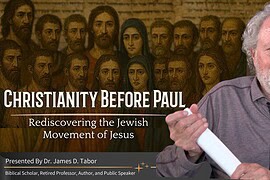I have written and lectured a lot on “When Prophecy Fails,” that is how various groups over the past 2500 years, both Jewish and Christian, have had their hopes and expectations dashed by what one might call the “brick wall” of historical reality. In times of global unrest and uncertainty, it seems that the “End of the Age” apocalyptic predictions begin to grow like mushrooms in a rain forest–sprouting up everywhere. And yet our “tired ole world” as Dylan called it, keeps going along. What about End Time prophecies and speculations? My question here is WHY apocalyptic expectations, predictions, and calculations always fail.
The late Norman Perrin, my New Testament professor at the University of Chicago, used to tell us that there was one thing certain in the study of the long history of Jewish and Christian apocalypticism—a 100-percent failure rate.
H.H. Rowley published a collection of essays that he had delivered in 1942, during the darkest days of WWII, titled The Relevance of Apocalyptic. Rowley never discounted the symbolic power and potential theological meaning of apocalyptic symbols. But he offers at one point an astute observation. At the time, Hitler had taken most of Europe and General Rommel had orders to march to Jerusalem, link up with the Arab allies and crush the Zionists once and for all. One could hardly imagine a better candidate for the “Beast” of Daniel 7 and Revelation 13 than Nazi Germany with its Führer. In both the United States and Britain, the Bible prophecy movement was having a heyday–particularly as the troop movements in the Middle East began to reflect the final verses of Daniel 11 regarding a “final evil ruler,” also known as the “King of the North,” modeled after the ancient Greek ruler Antiochus Epiphanies of Hanukkah fame! Rowley wrote:
“Yet where for more than two thousand years a hope has proved illusory, we should beware of embracing it afresh. The writers of these books were mistaken in their hopes of imminent deliverance; their interpreters who believed the consummation was imminent in their day proved mistaken; and they who bring the same principles and the same hopes afresh to the prophecies will prove equally mistaken” (p. 173).
One of the areas of study I have specialized in over the past four decades is the phenomenon of ancient and modern apocalypticism–namely those systems of thinking about the future in which an imminent “end of the age” is contemplated. I have published widely on this subject, from the Dead Sea Scrolls, to Jesus as an apocalyptic messiah, to David Koresh and Waco. Many of these publications I have put on-line and I encourage those of you who teach, study, or work in these areas to use them freely:
In my broad survey article “Ancient Jewish and Early Christian Millennialism,” in the Oxford Handbook of Millennialism, edited by Cathy Wessinger, I attempt to give a broad overview of the ancient period.
At the turn of the millennium–remember the Y2K panic?–I published “Why 2K?: The Biblical Roots of Millennialism” in Bible Review, which offers an overview of Christian apocalypticism through the ages. There is also “Apocalyptic Schemes and Dreams: How An Ancient Jewish Vision of the Future Came to Dominate the Modern World,” in The End of Days?: Millennialism from the Hebrew Bible to the Present, edited by Leonard J. Greenspoon and Ronald A. Simkins (Omaha: Creighton University Press, 2003), pp. 49-61.
On the Dead Sea Scrolls and Jesus as an apocalyptic figure of the late 2nd Temple Jewish period, see: “Dead Messiahs Who Don’t Return,” on the apocalyptic speculations in the Dead Sea Scrolls given at the American Academy of Religion Annual meeting in 1997. I have also uploaded to Youtube a lecture on the same topic you can view here:
Another related lecture is the following:
When Prophecy Fails: How Ancient Messianic Jews & Christians Survived Apocalyptic Disappointment
A few more key readings you can find here on my blog on-line:
“Standing in the Shadow of Schweitzer: What Can We Say about an Apocalyptic Jesus?” The Review of the Committee for the Scientific Examination of Religion 2:1 (2007): 8-10;
My study paper “One, Two, or Three Messiahs: Dynastic and Priestly Pedigrees from the Maccabees to Masada.”
“What the Bible Really Says About the Future,” in What the Bible Really Says, edited by Morton Smith and Joseph Hoffmann.
And finally, there are my two books–The Jesus Dynasty that attempts to lay out what we know of the historical Jesus as a radical apocalyptic preacher of his time, and Why Waco? co-authoried with Eugene Gallagher, that analyzes the David Koresh/Branch Davidian group as an example of a modern apocalyptic group whose hopes and expectations ended in disaster. Remember, it was David Koresh whose claim to fame was the ability to open the “Seven Seals.”
As a historian of religions I have to agree with H. H. Rowley’s cautionary skepticism about any such predictions in the future. I have studied closely the various apocalyptic schemes of the Adventist movement, the Jehovah’s Witnesses, the Worldwide Church of God, popular American Dispensationalism (Hal Lindsey et al.), and all the latest “Prophecy Beliefs” that are streaming on the internet. I find these movements endlessly fascinating, but on the whole their adherents are as deluded as they are sincere–which ends up being a toxic mixture.









Comments are closed.